Evaluating Country Programmes - OECD Online Bookshop
Evaluating Country Programmes - OECD Online Bookshop
Evaluating Country Programmes - OECD Online Bookshop
Create successful ePaper yourself
Turn your PDF publications into a flip-book with our unique Google optimized e-Paper software.
Traditional tools: relevance, efficacy and efficiency<br />
<strong>OECD</strong> 1999<br />
<strong>Country</strong> Assistance Evaluation in the Multilateral Development Banks<br />
The MDBs have traditionally attempted to measure relevance, efficacy and<br />
efficiency of projects and programmes. The same criteria have been used to evaluate<br />
country programmes and strategies. They may be broadly defined as follows:<br />
– Relevance – Whether the strategy, goal (s), objectives, activities and operations,<br />
policy formulation, economic sector work and aid mobilisation and coordination<br />
have addressed, and been consistent with, the needs of the country.<br />
How these relate to the institution’s mandate, the country’s internal strategies,<br />
priorities and policies as well as those of other donors and investors may<br />
also influence the relevance.<br />
– Efficacy – Whether a country programme has been effective in delivering<br />
results through its loan, technical co-operation, policy dialogue and other<br />
activities compared to stated intentions and objectives.<br />
– Efficiency – Whether the method and procedures employed to arrive at a<br />
country programme and strategy and the instruments used to implement it<br />
(loans, TC, policy dialogue, ESW, aid co-ordination, etc.) have been the most<br />
cost-efficient.<br />
Measuring relevance<br />
In the studies completed by the World Bank, relevance is measured by first<br />
examining the needs of the country over a period, normally at a macro-economic<br />
level and sometimes at the sector level. Successively, it is assessed by reviewing the<br />
Bank’s assistance to determine whether a correct diagnosis was made; whether the<br />
objectives of the strategy were consistent with the diagnosis; and if the assistance<br />
and instruments were adequate for achieving those objectives. On the whole, the<br />
Bank chose countries for their country assistance reviews (CARs) that had experienced<br />
substantial amounts of structural adjustment, sector adjustment, stabilisation<br />
or debt reduction funding. This facilitated a macro-economic assessment of the<br />
needs of the country, rather than a more detailed sector assessment of its needs. It<br />
also facilitated the assessment of the policy dialogue and ESW that the Bank undertook<br />
during that period. In almost all of the CARs and shorter country assistance notes<br />
(CANs) the strategy was judged to be relevant. The Zambia CAR concluded that the<br />
Bank’s strategy was less relevant to the country’s long-term development than it<br />
could have been. The Argentina CAR found the strategy to be relevant, but not the<br />
instruments. Some CARs (Argentina, Côte d’Ivoire and Bangladesh) found the country<br />
strategy to be more relevant in one period than another. In a number of cases (Ghana<br />
and Mozambique) the CAR chose not to give relevance rating to the strategy.<br />
Relevance examines whether the institutions’ strategy, goal (s), objectives and activities have<br />
addressed and been consistent with the needs of the country and how they relate to other priorities.<br />
157






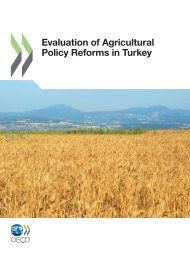
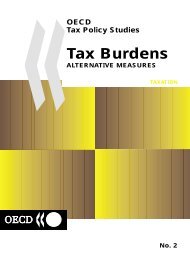
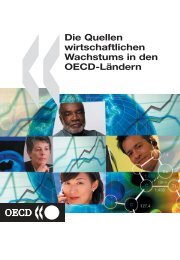
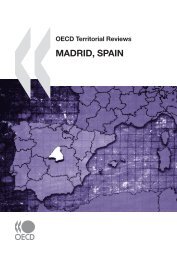



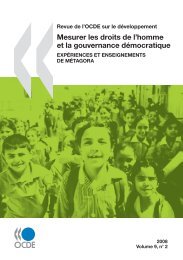
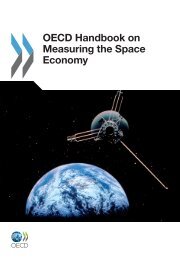
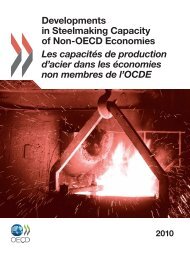

![CQE=U]^\]Z: KAZAKHSTAN - OECD Online Bookshop](https://img.yumpu.com/3915768/1/190x253/cqeuz-kazakhstan-oecd-online-bookshop.jpg?quality=85)